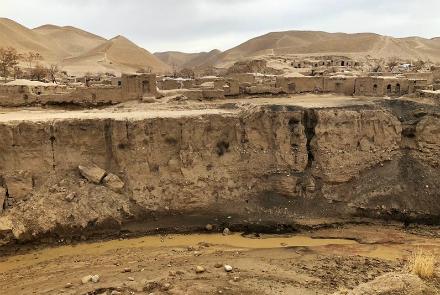The Afghanistan Research and Evaluation Unit (AREU) and an EU Delegation organized a one-day Open Dialogue on Tuesday in Kabul to discuss multidimensional needs of groundwater management in Afghanistan.
Groundwater Management is part of AREU’s three-pronged research effort into essential areas of Natural Resources Management (NRM) funded by the European Union (EU).
Some high-ranking government officials, representatives of national and international organizations, the EU and United Nations agencies officials attended the event and actively participated in discussions.
The rationale behind this groundwater management event started with acknowledging the importance of groundwater for Afghan livelihoods. It was also motivated by the realization that the development and protection of groundwater has received too little attention in Afghanistan, in part because it is not well understood, AREU reported.
Orzala Nemat, AREU Director said: “This is a great opportunity to amplify the attention on NRM at national and international level.”
“Because of the conflict, water and other natural resources were given little attention in the past. It’s now time to invest in prevention mechanisms and find a durable solution to periodical water shortage.” she added
"I am delighted to participate in this conference just a week after the EU Serena Dialogue which discussed the issue of climate change in Afghanistan.
“At this critical time when climate change impacts access to water in Afghanistan, proper groundwater management is key to ensuring the preservation of this strategic asset. The EU is proud to contribute in improving the management of natural resources of Afghanistan through several projects including the research project implemented by AREU" said EU Ambassador Pierre Mayaudon.
According to AREU, the overall objective of the exercise is to help policy makers, project managers, civil society leaders and other stakeholders to better understand the challenges, opportunities and possible path forward to develop and protect groundwater resources in Afghanistan.
It is also hoped that the final document can be used to promote the essential need to further develop in-depth technical studies (beyond only the Kabul sub-basin) in all basins of Afghanistan in order to plan timely measures.
AREU is an independent research institute based in Kabul that was established in 2002 by the assistance of the international community in Afghanistan. AREU achieves its mission by engaging with policy makers, civil society, researchers and academics to promote their use of AREU’s research-based publications and its library, strengthening their research capacity and creating opportunities for analysis, reflection and debate.
The EU funded three-pronged research project launched on December 2016 aims to contribute to improving the sustainability and increase the wealth of rural papulation, by enhancing the social and economic development of rural communities and reducing hunger vulnerability.
Climate Change Summit
Earlier this month, the EU hosted a debate on issues around climate change in the country titled “Climate Change in Afghanistan, Common Challenge, Collective Response”.
But delegates attending the conference said the Afghan government has not paid enough attention to the problem of climate change in Afghanistan.
Addressing the event, Mayaudon said election and peace are top priorities of the Afghan government but that the Kabul administration should not sideline the issue of climate change.
“Among those countries worldwide which are most affected by the impact of climate change, definitely Afghanistan is ranking very high not to say that Afghanistan is the world’s most affected country by the impact of climate change,” the EU envoy said.
“We have under our eyes the visible impact of climate change in Afghanistan be it in terms of drought, be it in terms of displacement of population and overall impact on the economy.”
“Still so little is discussed. Of course, we immediately hear that it is not a priority, priorities of the day, to say it at least, are peace and elections,” he said. “Discussing elections is also a golden opportunity to make candidates more accountable for their programs and we would like to see in those programs the improvement in livelihood of all citizens of this country and there will be no improvement in livelihood if the issue of climate change is not taken seriously.”
Other participants meanwhile read out results of research studies done in Kabul on Afghanistan’s water, and said that the country will face serious consequences of climate change through to 2030.
“In order to achieve sustainable and long-term peace, we cannot be focused on fighting insurgency only, we need to also deal with climate change as there are statistics that 80 percent of community conflicts are over land and water,” said Khwaga Kakar, head of Apama, a consultancy organization in Kabul.
There have been more than two thousand projects on climate change in Afghanistan according to a Climate Public Expenditure and Institutional Review conducted recently, said Shah Zaman Maiwandi, head of National Environment Protection Agency (NEPA).
"As the National Designated Authority for the Green Climate Fund (GCF), this year NEPA has endorsed two projects totaling approximately $83 million that are awaiting GCF approval," he said.
"The Government of the Islamic Republic of Afghanistan has spent at least $100 million each year for the period 2013 to 2015 from its own development budget on projects that directly address climate change adaptation and/or mitigation," Maiwandi added.
Drought Affects 2 Million People In Afghanistan
A UN report released in May said at least two million people are at risk of severe food insecurity because of the devastating drought in Afghanistan.
The UN Office for Coordination of Humanitarian Affairs (OCHA) said in its report that the hardest-hit are northern and western Afghanistan, where wheat planting has been either delayed or downsized in some 20 provinces, mainly because of a lack of rain and snowfall in the winter.
As many as 21,000 people were forced to leave their homes in western Badghis and Ghor provinces because of the drought, the OCHA said.
Some 1.5 million goats and sheep in the North-Eastern region are struggling to find food and more than 600 out of nearly 1,000 villages in the province are suffering from lack of water.
The report also said that the intensified conflict across many parts of the country exacerbates the effects of the drought and has limited the communities’ access to markets: in Helmand, village elders reportedly need to obtain special approval from the armed groups controlling their districts to access markets in areas under government control.
In Uruzgan province, people often cannot access the main market in Trinkot due to fighting and insecurity on the roads to the provincial capital. Following a temporary closure of the road to neighboring Kandahar province in April due to fighting, wheat prices went up by 50 percent in the city itself, and the price for fresh produce quadrupled within days, the report said.
It also said that in the 20 provinces most affected by the drought, nearly 15 million people rely on farming, livestock or labor opportunities in agriculture. Of these, an estimated two million people will become severely food insecure due to the drought.
Humanitarian partners are ramping up their response across the country trying to reach 1.4 million of the most vulnerable girls, boys, women and men struck by the drought.
OCHA said partners urgently need $115 million; the majority of this amount will provide food support to help families through the lean season and to provide them with drinking water for six months.
A quick, comprehensive response will enable the delivery of food and water to the rural villages and help to avoid the migration of families to cities where they risk losing all of their few possessions, and where they lack shelter and access to health facilities and schools for their children, read the report.


